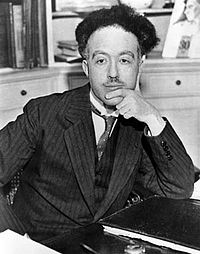Louis de Broglie Scientist
Louis-Victor-Pierre-Raymond, 7th duc de Broglie (/dəˈbrɔɪ/; French: [dəbʁɔj] or [dəbʁœj] (13px ); 15 August 1892 – 19 March 1987) was a French physicist who made groundbreaking contributions to quantum theory. In his 1924 PhD thesis he postulated the wave nature of electrons and suggested that all matter has wave properties. This concept is known as the de Broglie hypothesis, an example of wave-particle duality, and forms a central part of the theory of quantum mechanics.De Broglie won the Nobel Prize for Physics in 1929, after the wave-like behaviour of matter was first experimentally demonstrated in 1927.The 1925's pilot-wave picture, and the wave-like behaviour of particles discovered by de Broglie was used by Erwin Schrödinger in his formulation of wave mechanics. The pilot-wave model and interpretation was then abandoned, in favor of the quantum formalism, until 1952 when it was rediscovered and enhanced by David Bohm.Louis de Broglie was the sixteenth member elected to occupy seat 1 of the Académie française in 1944, and served as Perpetual Secretary of the French Academy of Sciences.
Search
Scientist
| awards | |
|---|---|
| doctoral advisor | |
| doctoral student | |
| Field of study |
Topical connections
Louis de Broglie on Wikipedia
External resources
- http://aflb.ensmp.fr
- http://neo-classical-physics.info/uploads/3/0/6/5/3065888/de_broglie_-_hidden_thermodynamics_book.pdf
- http://neo-classical-physics.info/uploads/3/0/6/5/3065888/de_broglie_-_measurement_in_wave_mechanics.pdf
- http://neo-classical-physics.info/uploads/3/0/6/5/3065888/de_broglie_-_new_conception_of_light.pdf
- http://www.academie-francaise.fr/immortels/base/academiciens/fiche.asp?param=580
- http://www.angelfire.com/realm/gotha/gotha/broglie.html
- http://www.nobel.se/physics/laureates/1929/broglie-bio.html
